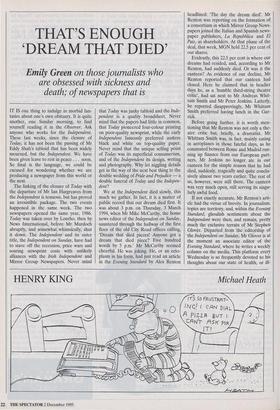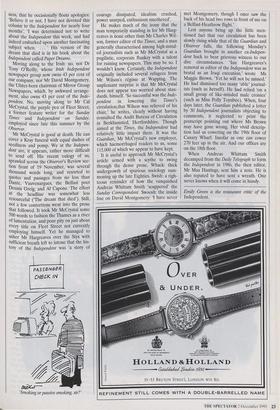THAT'S ENOUGH `DREAM THAT DIED'
Emily Green on those journalists who
are obsessed with sickness and death; of newspapers that is
IT IS one thing to indulge in morbid fan- tasies about one's own obituary. It is quite another, one Sunday morning, to find yourself reading it in the Observer. Ask anyone who works for the Independent. These last weeks, since the closure of Today, it has not been the passing of Mr Eddy Shah's tabloid that has been widely mourned, but the Independent. We have been given leave to rest in peace . . . soon. So final is the language, we could be excused for wondering whether we are producing a newspaper from this world or the next.
The linking of the closure of Today with the departure of Mr Ian Hargreaves from the Independent is tenuous, but has proved an irresistible package. The two events happened in the same week. The two newspapers opened the same year, 1986. Today was taken over by Lonrho, then by News International, before Mr Murdoch abruptly, and somewhat whimsically, shut it down. The Independent and its sister title, the Independent on Sunday, have had to stave off the recession, price wars and soaring newsprint costs with unlikely alliances with the Irish Independent and Mirror Group Newspapers. Never mind that Today was junky tabloid and the Inde- pendent is a quality broadsheet. Never mind that the papers had little in common, that Today pioneered four-colour printing on poor-quality newsprint, while the early Independent famously preferred austere black and white on top-quality paper. Never mind that the unique selling point of Today was its superficial consumerism, and of the Independent its design, writing and photography. Why let niggling details get in the way of the next best thing to the double wedding of Pride and Prejudice — a double funeral of Today and the Indepen- dent?
We at the Independent died slowly, this much we gather. In fact, it is a matter of public record that our dream died first. It was about 3 p.m. on Thursday, 3 March 1994, when Mr Mike McCarthy, the home news editor of the Independent on Sunday, sauntered through the hallway of the first floor of the old City Road offices calling, `Dream that died pieces! Anyone got a dream that died piece? Five hundred words by 5 p.m.' Mr McCarthy seemed cheerful. He was joking. He, or an ecto- plasm in his form, had just read an article in the Evening Standard by Alex Renton headlined: 'The day the dream died'. Mr Renton was reporting on the formation of a consortium in which Mirror Group News- papers joined the Italian and Spanish news- paper publishers, La Repubblica and El Pais, as shareholders. At that phase of the deal, that week, MGN held 22.5 per cent of our shares.
Evidently, this 22.5 per cent is where our dreams had resided, and, according to Mr Renton, had suddenly died. Or was it the canteen? As evidence of our decline, Mr Renton reported that our canteen had closed. Here he claimed that in headier days he, as a 'humble third-string theatre critic', had sat next to Mr Andreas Whit- tam Smith and Mr Peter Jenkins. Latterly, he reported disapprovingly, Mr Whittam Smith preferred having lunch in the Gar- rick.
Before going further, it is worth men- tioning that Mr Renton was not only a the- atre critic but, briefly, a dramatist. Mr Whittam Smith was, in fact, mainly eating in aeroplanes in those fateful days, as he commuted between Rome and Madrid run- ning up finance from our European part- ners. Mr Jenkins no longer ate in our canteen for the simple reason that he had died, suddenly, tragically and quite conclu- sively almost two years earlier. The rest of us, however, were still there. The canteen was very much open, still serving its singu- larly awful food.
If not exactly accurate, Mr Renton's arti- cle had the virtue of brevity. In journalism, topics are territory, and, within the Evening Standard, ghoulish sentiments about the Independent were then, and remain, pretty much the exclusive terrain of Mr Stephen Glover. Departed from the editorship of the Independent on Sunday, Mr Glover is at the moment an associate editor of the Evening Standard, where he writes a weekly column on the media. This platform every Wednesday is so frequently devoted to his thoughts about our state of health, or ill- ness, that he occasionally floats apologies: `Believe it or not, I have not devoted this column to the Independent for nearly four months', 'I was determined not to write about the Independent this week, and had indeed embarked upon another fascinating subject when. . . . ' His version of the dream that died is in his book about the Independent called Paper Dreams.
Moving along to the Irish: no, not Dr Tony O'Reilly, whose Irish Independent newspaper group now owns 43 per cent of our company, nor Mr David Montgomery, the Ulster-born chairman of Mirror Group Newspapers, which, by awkward arrange- ment, also owns 43 per cent of the Inde- pendent. No, moving along to Mr Cal McCrystal, the purple pen of Fleet Street, a former feature writer for the Sunday Times and Independent on Sunday, employed since late this summer by the Observer.
Mr McCrystal is good at death. He can cover a Kray funeral with equal dashes of seediness and pomp. We at the Indepen- dent are, it appears, rather more difficult to send off. His recent eulogy of us, sprawled across the Observer's Review sec- tion front of 19 November, was several thousand words long, and resorted to quotes and passages from no less than Dante, Vauvenargues, the Belfast poet Dennis Greig, and Al Capone. The effort at the headline was somewhat less resourceful (`The dream that died'). Still, not a few contortions went into the prose that followed. It took Mr McCrystal some 500 words to fashion the Thames as a river of lamentation, and pour pity on just about every title on Fleet Street not currently employing himself. Yet he managed to usher Mr Hargreaves over the Styx with sufficient breath left to intone that the his- tory of the Independent was 'a story of Smoking or passive smoking, sir?' courage dissipated, idealism crushed, power usurped, enthusiasm smothered'. He makes much of the irony that the man temporarily standing in for Mr Harg- reaves is none other than Mr Charles Wil- son, former editor of the Times, and a man generally characterised among high-mind- ed journalists such as Mr McCrystal as a pugilistic, corporate flunkey with a talent for ruining newspapers. This may be so. I wouldn't know. Certainly, the Independent originally included several refugees from Mr Wilson's regime at Wapping. The unpleasant surprise is that Mr McCrystal does not appear too worried about stan- dards, himself. 'So successful was the Inde- pendent in lowering the Times's circulation,that Wilson was relieved of his chair,' he writes, clearly without having consulted the Audit Bureau of Circulation in Berkhamsted, Hertfordshire. Though aimed at the Times, the Independent had relatively little impact there. It was the Guardian, Mr McCrystal's new employer, which haemorrhaged readers to us, some 115,000 of which we appear to have kept. It is useful to approach Mr McCrystal's article armed with a scythe to swing through the dense prose. Whack: thick undergrowth of spurious sociology sum- moning up the late Eighties. Swish: a righ- teous reminder of how the vanquished Andreas Whittam Smith `scuppered' the Sunday Correspondent. Swoosh: the inside line on David Montgomery: 'I have never met Montgomery, though I once saw the back of his head two rows in front of me on a Belfast-Heathrow flight.'
Lest anyone bring up the little men- tioned fact that our circulation has been slowly rising while that of the Guardian and Observer falls, the following Monday's Guardian brought in another ex-Indepen- dent hack to bear grievous witness to our dire circumstances. 'Ian Hargreaves's removal as editor of the Independent was as brutal as an Iraqi execution,' wrote Ms Maggie Brown. 'Yet he will not be missed.' He had dismissed too many 'able' journal- ists (such as herself). He had relied 'on a small group of like-minded male cronies' (such as Miss Polly Toynbee). When, four days later, the Guardian published a letter by 30 Independent journalists objecting to comments, it neglected to print the postscript pointing out where Ms Brown may have gone wrong. Her vivid descrip- tion had us cowering on the 19th floor of Canary Wharf. Insofar as one can cower 270 feet up in the air. And our offices are on the 18th floor.
When Andreas Whittam Smith decamped from the Daily Telegraph to form the Independent in 1986, the then editor, Mr Max Hastings, sent him a note. He is also reputed to have sent a wreath. One never knows when it will come in handy.
Emily Green is the restaurant critic of the Independent.











































































 Previous page
Previous page